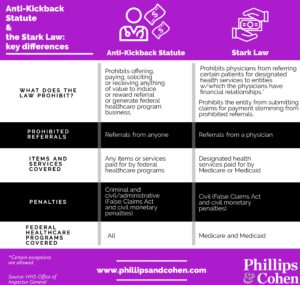
Under the federal Anti-Kickback Statute, a company commits fraud when it offers doctors and other healthcare providers financial incentives to use the company’s products or services, for which payment may be made under Medicare, Medicaid, or other federally funded healthcare programs. The Anti-Kickback Statute was first enacted in 1972 and has undergone multiple amendments since its inception, showing the evolving approach to healthcare fraud.
Examples of illegal kickbacks in healthcare can be cash payments but often include other items of monetary value, such as gifts, free or discounted supplies or services, and travel. Hospitals and other companies often try to disguise their medical kickbacks as legitimate payments. For example, they might pay doctors inflated rates for speaking engagements or pay above fair market value to lease office space. State-level anti-kickback laws exist and apply to medical providers and entities participating in Medicaid programs, indicating that state-level compliance is also crucial.
Even if there is a lawful basis for a payment, the financial arrangement may still be fraudulent if one purpose of the payment is to influence a doctor or other healthcare provider to use the company’s products or services. Any claim submitted to government health care programs implies the entity’s compliance with anti-kickback laws, implying any violation can render such claims false under federal and state False Claims Acts.
Violating the Anti-Kickback Statute is classified as a felony and can lead to severe penalties, including up to ten years in jail and fines up to $100,000 per violation. Those found guilty of Anti-Kickback Statute violations may be subject to the Civil Monetary Penalties Law (CMPL), facing additional fines of up to $50,000 per violation and treble the amount of the remuneration involved.

The False Claims Act offers whistleblowers an effective way to expose and stop pharmaceutical and medical kickbacks in the healthcare system. Healthcare kickbacks – hidden financial arrangements between doctors and hospitals or other healthcare providers or companies – are one of the most complicated and troubling aspects of the healthcare system.
Kickbacks to doctors or other healthcare providers are prohibited by two federal laws: the Anti-Kickback Statute [42 U.S. Code § 1320a–7b(b)] and the Stark Law (42 U.S.C. 1395nn). Whistleblowers can work with the government to stop healthcare kickbacks and improper referrals and receive a reward by filing a “qui tam” lawsuit under the False Claims Act.
Medical and pharmaceutical kickbacks come in many forms. But in every kickback case, healthcare providers will provide some material benefit in return for other providers prescribing or using their products or services.
In most instances, kickbacks are illegal according to anti-kickback laws. Doctors are supposed to decide on the most appropriate treatment for their patients without consideration of their own financial interests.
Federal laws prohibit kickbacks and improper compensation to doctors and other healthcare providers as specified by the Stark Law because those financial incentives often result in medically unnecessary treatment and the use of more expensive products. That in turn results in higher costs to patients, Medicare, Medicaid, and other healthcare insurance programs.
Violations of the Anti-Kickback Statute (AKS) occur when a person or entity knowingly and willfully offers, pays, solicits, or receives any remuneration to induce or reward referrals of items or services reimbursable by a federal healthcare program.
Examples of Anti-Kickback Statute violations could include:
Phillips & Cohen has represented whistleblowers in many Anti-Kickback Statute and Stark Act cases that have recovered big sums and earned our whistleblower clients substantial rewards. Here are some examples of our qui tam cases involving the Stark Law and Anti-Kickback Statute:
Phillips & Cohen also has brought successful whistleblower cases involving kickback allegations against blood testing labs, pharmacies, hospitals, nursing home chains and others in the healthcare industry.
The federal Anti-Kickback Statute and the Stark Law have key differences in what they prohibit and by whom, while sharing similar goals of protecting patients and preventing waste, fraud and abuse in government healthcare programs.
The Anti-Kickback Statute prohibits anyone from offering or receiving kickbacks in any form to induce or reward those who generate business involving the treatment of patients and services that are reimbursed by Medicare, Medicaid and other government healthcare programs. The Anti-Kickback Statute has some exceptions, referred to as “safe harbors.”
The Stark Law is more specific than the Anti-Kickback Statute. Stark prohibits physicians from referring Medicare and Medicaid patients for certain medical services to entities with which the physician or immediate family member has a financial relationship, with certain exceptions, or safe harbors. Stark does not require proof of intent.
Stark also prohibits health-industry entities from submitting claims to Medicare and Medicaid for services based on a physician referral prohibited by Stark.
Those who violate the Anti-Kickback Statute may be subject to criminal as well as civil penalties, while those who violate the Stark Law are subject to only civil penalties.
Violations of the Anti-Kickback Statute and the Stark Law also can be violations of the False Claims Act, and therefore could be the basis for a qui tam lawsuit.
If you are aware of medical kickbacks or Stark violations and would like to get a free, confidential review of your case by experienced whistleblower attorneys, please visit our contact page. Phillips & Cohen works with whistleblowers on a contingency basis, which means there is no payment unless the government recovers funds from the case and pays the whistleblower a reward.